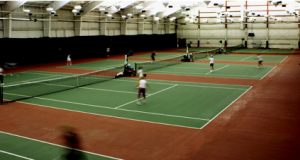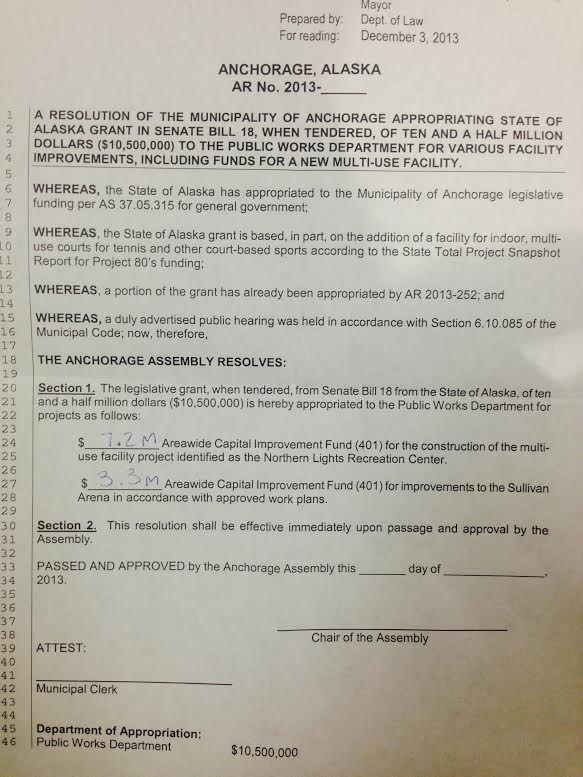After two months of back and forth about whether a rec center with public tennis courts should be built in Anchorage with grant money from the state legislature, the city assembly voted the idea down at their regular meeting Tuesday night, but Mayor Dan Sullivan has already introduced a new proposal.
Several options for what to do with the money meant for construction of the Northern Lights Recreation Center in the Turnagain neighborhood were introduced at Tuesday’s Assembly meeting, but none succeeded. Anchorage Mayor Dan Sullivan introduced a new ordinance toward the end of the meeting. He explained his proposal at a press conference at City Hall.

“I laid on the table an ordinance that again reallocates funding from the state grant at a level that I think is probably appropriate,” Sullivan said. “It leaves $7.2 million for the new multi-use sports facility which was the amount of their original request to the legislature back in the spring.”
Tennis supporters had the backing of Mayor Sullivan, but not the Assembly. The Anchorage Tennis Association lobbied Juneau directly for the money to build a rec center. Then millions in funding, which the Assembly did not request, was rolled into a 437 million allocation for city infrastructure maintenance.
Some Assembly Members disagreed with the process. Some Lawmakers say they were unaware they had given money for the project. Mayor Sullivan said there was nothing wrong with it.
“It’s not uncommon for a group like the Alaska Tennis Association, a nonprofit, to go to Juneau and seek support to improve or add to municipal facilities,” Sullivan said. “It happens all the time. So the complaints about the process are probably political in nature and not logical in nature.”
At Tuesday’s meeting, Assembly Member Amy Demboski proposed an amendment that would have sent millions intended for the rec center back to Juneau – it failed.
Measures introduced by Tim Steele and Bill Starr setting aside funding for the project also failed.
Tennis supporters seemed baffled and disappointed after the votes. Originally the Mayor and the Tennis Association had discussed the possibility of $10.5 million for the project. The Alaska Tennis Associations original request was $7.2 million says Allen Clendaniel, President of the Alaska Tennis Association.
“7.2 is what the Alaska Tennis Association asked for when we started this project a long time ago,” Clendaniel said.
Clendaniel says if he could do it all over again, his organization would have gone to the Assembly as well as the Mayor.
“In hindsight, I wish we would have done that. You know, we’re a non-profit board that generally tries to teach kids tennis and run tennis tournaments. And we just you know went straight to the legislature,” Clendaniel said. “I wish we’d gone to the Assembly and have done that. It’s probably our lack of sophistication in how the capital budget process worked.”
Clemdaniel says he’s hopeful that at least one assembly member will switch sides on the issue to allow it to pass.
Public testimony on Sullivan’s new proposal is set for the next regular Assembly meeting Tuesday, Dec. 17.
Daysha Eaton is a contributor with the Alaska Public Radio Network.
Daysha Eaton holds a B.A. from Evergreen State College, and a M.A. from the University of Southern California. Daysha got her start in radio at Seattle public radio stations, KPLU and KUOW. Before coming to KBBI, she was the News Director at KYUK in Bethel. She has also worked as the Southcentral Reporter for KSKA in Anchorage.
Daysha's work has appeared on NPR's "Morning Edition" and "All Things Considered", PRI's "The World" and "National Native News". She's happy to take assignments, and to get news tips, which are best sent via email.
Daysha became a journalist because she believes in the power of storytelling. Stories connect us and they help us make sense of our world. They shed light on injustice and they comfort us in troubled times. She got into public broadcasting because it seems to fulfill the intention of the 4th Estate and to most effectively apply the freedom of the press granted to us through the Constitution. She feels that public radio has a special way of moving people emotionally through sound, taking them to remote places, introducing them to people they would not otherwise meet and compelling them to think about issues they might ordinarily overlook.





